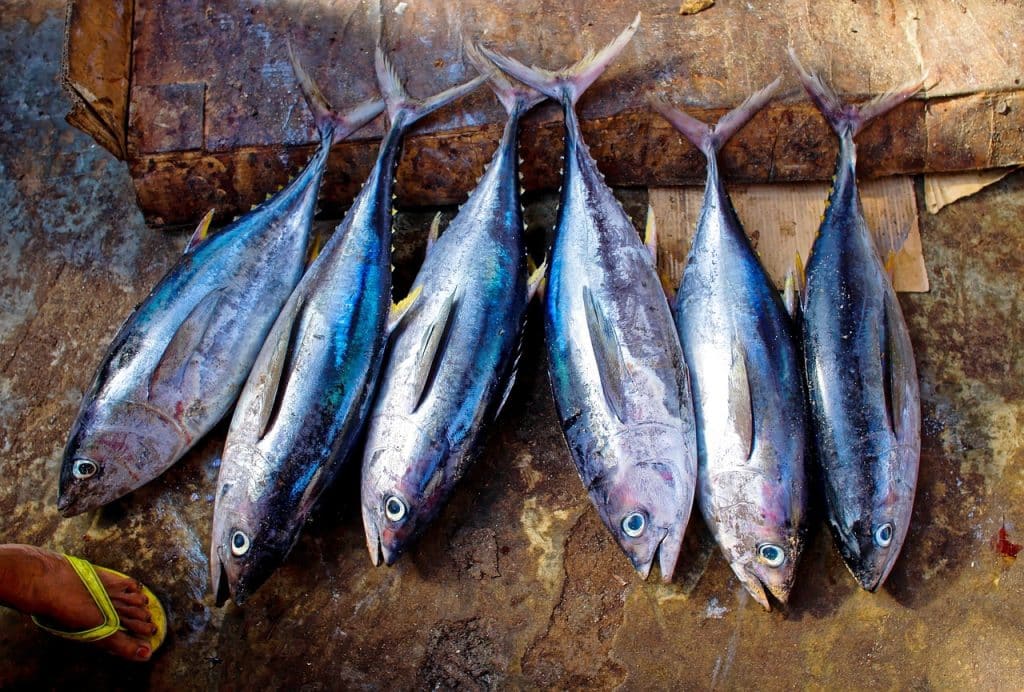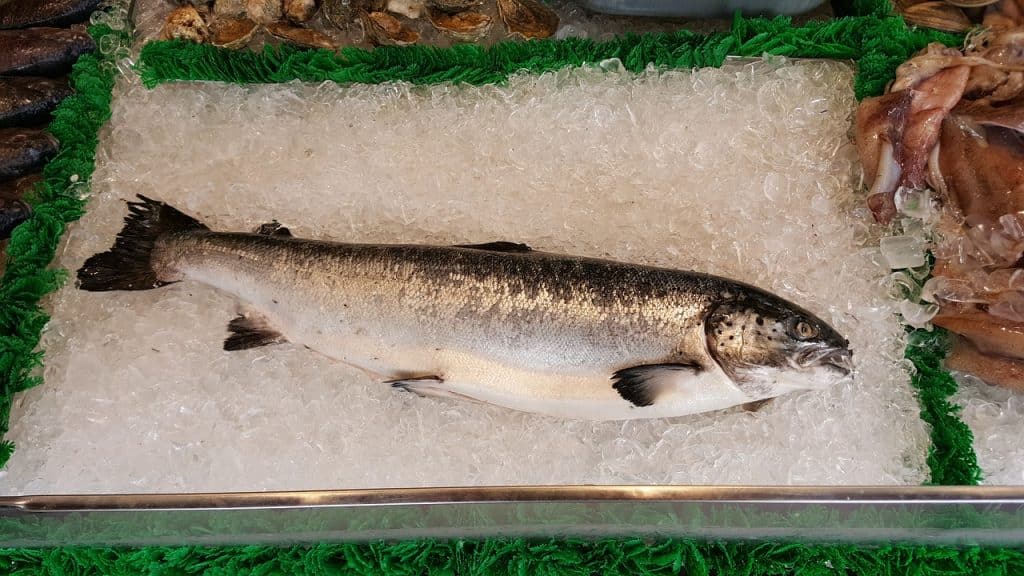Can Dogs Eat Raw Fish? A Vet’s Opinion

Raw fish refers to fish that has not been cooked or heat-treated before consumption. It is typically consumed in dishes such as sushi, sashimi, or ceviche. Raw fish is often chosen for its freshness and delicate flavour, but can you feed Raw fish to your dog?
Feeding raw fish to dogs is a topic with differing opinions. While some advocate for it, there are potential risks involved. Raw fish may contain harmful parasites, bacteria, or viruses that can cause foodborne illnesses in dogs. Consulting with a veterinarian is essential before considering raw fish as part of a dog’s diet. However, due to the dangers involved, we will recommend against it.
Let’s dive in:
Benefits Of Raw Fish For Dogs
Feeding raw fish to dogs can offer several potential benefits. First, raw fish is nutritionally rich and provides a source of high-quality protein, essential fatty acids, and vital nutrients such as omega-3 fatty acids, vitamin D, and B vitamins. These nutrients are essential for a dog’s overall health and can contribute to a shiny coat, healthy skin, and optimal cognitive function. In addition to its nutritional value, some proponents of raw fish believe that it can promote better digestive health in dogs. Being a natural and biologically appropriate food, raw fish closely resembles the diet of dogs’ wild ancestors. This similarity may enhance digestion and nutrient absorption, potentially reducing digestive issues such as bloating or gas.
Raw fish can also benefit a dog’s dental health. Chewing on raw fish, mainly fish with small bones or cartilage, can help clean a dog’s teeth and gums. The gnawing action can aid in removing plaque and tartar buildup, contributing to better dental hygiene and potentially reducing the risk of dental diseases. Introducing raw fish as part of a varied diet can offer dogs different flavours and textures, adding to their overall enjoyment of food. Providing a diverse range of proteins helps prevent food sensitivities or allergies and ensures a balanced nutrient intake for optimal health. Furthermore, raw fish can be a lean protein source, making it suitable for dogs that need to manage their weight. With lower fat content in certain fish varieties, it offers a satisfying and nutritious option without adding excessive calories to their diet.

How To Safely Give Raw Fish To Dogs
When feeding raw fish to your dog, it is crucial to source high-quality fish from reputable suppliers. Look for fish specifically labelled as safe for raw consumption, such as sushi-grade fish. Ensure that the fish is fresh and properly handled to maintain its quality. To eliminate potential parasites, it is essential to freeze the raw fish. Place it in the freezer at a temperature of -4°F (-20°C) or lower for a minimum of 7 days. This freezing process helps kill parasites and reduces the risk of infection. Thaw the frozen fish safely in the refrigerator. Avoid thawing at room temperature, as it can promote bacterial growth and increase the risk of foodborne illness. Thawing in the refrigerator maintains a controlled temperature and minimizes the growth of harmful bacteria.
Maintaining good hygiene is essential when handling raw fish. Wash your hands thoroughly with soap and water before and after handling the fish. Clean and sanitize any utensils, cutting boards, or surfaces that come into contact with the raw fish to prevent cross-contamination. When portioning the raw fish, ensure that the pieces are appropriate for your dog’s size. Avoid giving large chunks or bones that could pose a choking hazard. It is essential to supervise your dog while they are eating to ensure they chew and swallow the fish safely. Raw fish should be part of a balanced diet for your dog. It should be supplemented with other food sources to provide a variety of nutrients. Please consult with a veterinarian or a professional in canine nutrition to ensure that your dog’s diet meets its specific nutritional needs. Monitor your dog closely after introducing raw fish to its diet. Watch for any signs of digestive upset, such as diarrhoea, vomiting, or changes in appetite.
Will Raw fish Make A Dog Sick?
Raw fish may contain parasites such as tapeworms, roundworms, or flukes. These parasites can lead to infestations in a dog’s gastrointestinal tract, causing symptoms like weight loss, poor appetite, diarrhoea, vomiting, and nutrient deficiencies. In severe cases, these parasites can even cause blockages or damage to internal organs. Moreover, raw fish can harbour harmful bacteria like Salmonella, Listeria, or E. coli. Dogs consuming raw fish contaminated with these bacteria can develop foodborne illnesses characterized by symptoms such as vomiting, diarrhoea, abdominal pain, fever, and dehydration. It’s not only a risk to the dog’s health but can also pose a danger to humans in the household who come into contact with contaminated surfaces or the dog’s faeces.
Furthermore, certain types of fish may contain high levels of mercury and other environmental toxins like PCBs or dioxins. These toxins can accumulate in a dog’s body over time, leading to mercury poisoning or other adverse effects. Mercury toxicity can affect the nervous system, resulting in symptoms such as muscle weakness, tremors, and difficulty walking. Other toxins can cause organ damage, impair immune function, or disrupt hormonal balance. In addition, dogs can develop allergies to fish proteins, and feeding raw fish increases the risk of triggering allergic reactions. Allergies can manifest as itching, skin inflammation, ear infections, digestive upset, or respiratory issues. Severe allergic reactions, like anaphylaxis, may require immediate veterinary attention. Lastly, relying solely on raw fish as the main component of a dog’s diet can lead to nutritional imbalances. Dogs require a balanced diet that includes various protein sources, fruits, vegetables, and essential nutrients. Depending solely on raw fish may result in deficiencies or excesses of certain nutrients, such as vitamins, minerals, or essential fatty acids, which can negatively impact the overall health of the dog.

Vet’s Summary
Before feeding raw fish to your dog, it is essential to consider the potential risks and benefits carefully. While raw fish can provide nutritional value, it can also expose dogs to parasites, bacteria, toxins, and the risk of nutritional imbalances. Consulting with a veterinarian is crucial to assess your dog’s specific needs, potential allergies or sensitivities, and overall health before incorporating raw fish into its diet. Additionally, probiotics can be beneficial for dogs in supporting digestive health and immune function. Probiotics are beneficial bacteria that help maintain a healthy balance in the gut microbiome. They can aid in digestion, nutrient absorption, and managing gastrointestinal issues.
Videos To Watch
If you are wondering what related foods are good to give your dog, watch this:
And if you want to know what a dog can NOT eat, watch this:






